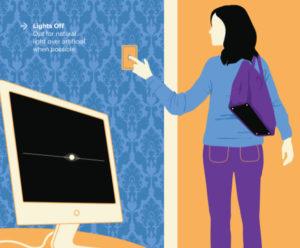From WebMD.com LIVING by Colleen Oakley and TheSmartHuman.Com
Want to be a better employee? Tweak your office space to become more productive and healthier—at work and at home.
Unplug your electronics when not in use. “Studies have found that electromagnetic activity affects your circadian rhythms, or sleep patterns,” says Aly Cohen, MD, founder of TheSmartHuman.com and co-editor of Integrative Environmental Medicine. “Other things can help, too, like turning off your cell phone at work and using your desk phone.”
 Turn off the lights. A recent study found that too much exposure to artificial light was linked to premature aging, as well as a loss in muscle mass and an increased risk for osteoporosis. “If you have a window, open the shades to get as much natural light as possible,” says Cohen.
Turn off the lights. A recent study found that too much exposure to artificial light was linked to premature aging, as well as a loss in muscle mass and an increased risk for osteoporosis. “If you have a window, open the shades to get as much natural light as possible,” says Cohen.
Clean your air. Buildings with poor ventilation or air pollution are linked to respiratory infections, headaches, and even depression. “Take frequent walks to get fresh air, when possible,” says Cohen. “Or invest in a portable air purifying machine.” You can also decorate your office with plants known for their air cleaning capabilities like money plant, mother’s tongue, and areca palm.
Dust often. Some 95% of dust in homes and workspaces contains toxic chemicals, according to a new study. “Chemicals in everything from cleaning supplies to office furniture to copier chemicals can break down and are found in the dust that we touch and breathe in on a daily basis,” says Cohen. Wipe down everything in your office with a damp cloth (using water only). If you have an office cleaning crew, leave non-toxic cleaning supplies for them to use in your work space.
A RECENT STUDY SUGGESTS THAT PEOPLE WHO WORK IN “GREEN” buildings—defined as environmentally responsible construction that uses sustainable materials—think better in the office, sleep better when they get home, and are happier and more productive. Workers in these buildings also reported 30% fewer health issues, such as headaches and eye and respiratory infections. So far, so good for those working in green buildings, but what about everyone else? Try these tips to make your workspace greener—and boost your own health and happiness.
BY THE NUMBERS:
75% = Percentage of the world’s population exposed to artificial light at night, which health experts believe may affect people’s circadian rhythms
25% = Percentage by which green building workers 75% outperformed other employees on cognitive tests
10 = Number of harmful chemicals in indoor dust, according to researchers at George Washington University


 Turn off the lights. A recent study found that too much exposure to artificial light was linked to premature aging, as well as a loss in muscle mass and an increased risk for osteoporosis. “If you have a window, open the shades to get as much natural light as possible,” says Cohen.
Turn off the lights. A recent study found that too much exposure to artificial light was linked to premature aging, as well as a loss in muscle mass and an increased risk for osteoporosis. “If you have a window, open the shades to get as much natural light as possible,” says Cohen.


















